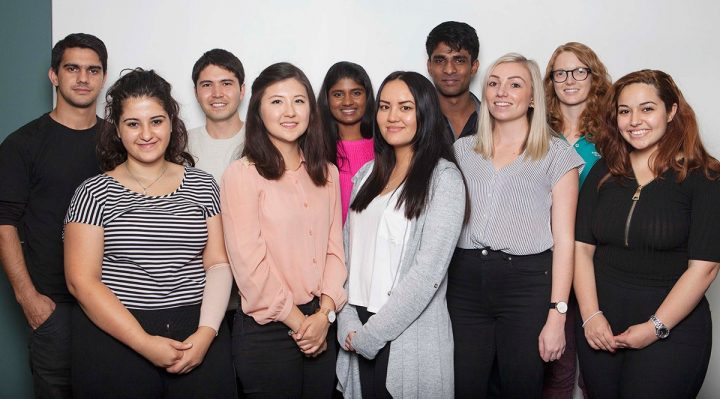But what can I do?

ChilOut, Children Out Of Immigration Detention, is a major advocacy group for ending Australia’s uniquely draconian status of being the only Western democracy that keeps refugee children in prison-like lockups. ChilOut’s Youth Ambassadors turned up in force on Sunday evening, October 30, to educate the public about this and alternatives at the Blackheath Baptist Café Church, together with the representatives of the Blue Mountains Refugee Support Group, the largest of its kind in Australia.
The packed out event with more than 80 attendees was organised by the Catalyst Social Justice Group of the BBC. The ChilOut presenters were led by campaign coordinator, Niru Palanivel, a teacher and human rights lawyer and two university student ambassadors, with refugee and migrant backgrounds: Gulnaz Beg from Afghanistan and Vijhai Utheyan from Sri Lanka.

Having heard the refugees’ stories, there were audience members who said later they felt ashamed to be Australians. Indeed, the government could only maintain its mandatory detention policy by a long campaign of misinformation including the systematic demonisation of boat refugees and keeping them in remote offshore facilities in conditions that the Gestapo would have endorsed.
Seeing the faces of these refugees at this event by meeting them in person, contributed to breaking down ‘the out of sight out of mind’ mentality, which the Australian Government is so keen to foster among the public. When criminals receive prison sentences in Australia, it will be for a specific duration but the refugee children together with their parents who committed no crime in trying to reach Australia to seek asylum, are subjected to incarceration of indefinite duration. It was also pointed out by the Ambassadors, that children who were born in detention and who are now several years old, never experienced freedom and to them incarceration and lack of education behind barbed wires, is the only way of life they know. There is a consensus among health professionals who dealt with these children that they are dehumanised and traumatised to such an extent that many of them will be damaged for life.
Because Gulnaz’s family belonged to a particular ethnic group in Afghanistan, the Taliban targeted them for extermination, so their choices were between the devil and the deep blue sea. They literally chose the latter, by selling everything they had, including her mother’s wedding ring to be able to escape the country. After three attempts that included getting shipwrecked, it was third time lucky. They made it to Australia when she was four years old. Her younger sister, who was under two when they were on the boat, took her first steps on the refugee boat out on the open sea. Her parents did not know whether to smile with joy at this landmark event or cry in terror at the very real prospect that the boat may sink.
There was also the story of a child who after many years of detention was finally released and went to school. The teacher could not tear him away from the classroom window where he just kept looking out, as it turned out, because he never had an access to a window before through which he could have seen the outside world.
Listening to these stories, I had a flashback to my escape from behind the Iron Curtain as a 17 year old, from communist Hungary to the West in 1964. The train stopped at the Austrian-Hungarian border with its tall, barbed wire fence and the Hungarian guards with their Alsatian dogs walking alongside the train. The few minutes, while the train was stationary at the border, seemed to me like eternity. I was sweating and trembling with fear. And when the train started up eventually and crossed to Austria, I jumped up and cried out: ‘I am free’.
Australia welcomed me with open arms as a refugee then. I would have never imagined, that our country which prides itself as a land of ‘fair go’ with ‘boundless plains to share’, would ever sink so low as to put children behind an Iron Curtain.
It was also revealed by ChilOut, that children at the offshore detention centres are called by numbers, not by their names; a literal example of dehumanisation when people lose their names and become numbers. Remember, inmates in the Nazi concentration camps were also called by their numbers only, which were tattooed on their forearms.
George Winston, the Secretary of the Blue Mountains Refugee Support group also talked about the many ways his Group assists a staggering number of 750 refugees, that include clothing them, providing scholarship to refugee children and finding them accommodation and employment. He also recalled his own experience as a Jew in wartime Poland. Relating his story to the Afghan born Gulnaz, he said that he was in mortal danger in Poland then because he looked a Jew and there was a policy of extermination towards the Jews.
It costs $400 000 per year to keep a single refugee in our offshore detention centres. If we scrapped this policy and spent the same amount of money we waste on it on improving living quarters for refugees in Indonesia, in other vital areas of our the region and on speeding up the assessment process, we would likely to be both more effective in stopping the boats and more humane simultaneously. That way we could restore our now tarnished image as a country of ‘fair go’ and would stop breaching our UN obligation not to violate human rights.
During the lively Q and A session about alternatives to the children’s incarceration, there was an amazing moment. Although it was a predominantly adult audience,
I heard a boy’s voice who happened to sit right behind me. He asked:
‘I am only twelve, but what can I do?’
I was so touched by his initiative that I swung around on my seat to see who was this twelve year old who would venture to ask such a mature question? As I caught sight of the boy’s magnificently curious, innocent and down to earth and casual expression, I could not help myself but to stroke his hair in appreciation.
The Campaign Coordinator of ChilOut, Niru Palanivel, a Teacher and Human Rights Lawyer, answered him in an equally matter of fact way. This was the gist of what she said:
‘You can do a lot. You can talk about this in school with your friends and teachers. And you can write a letter to politicians. They will take much more notice of you as a twelve year old than of adults.’
As I was mentally recapping this moving exchange, my mind drifted to a memory. It was this striking British film, The Boy In The Striped Pyjamas, I saw a few years ago about a tragic friendship between two eight year old boys in Germany during World War II. One boy was in the Nazi concentration camp, tucked away in the bush, out of sight, out of mind, at the back of this town. The other boy stumbled upon the camp during one his daily walks in the bush. He saw the boy on the other side of the barbed wire fence and they struck up a conversation. They became friends in secret. The boy who was free began to steal food from home to feed his starving mate. There was a hole big enough under a section of the fence where he could pass the food through. The only complication was, that the free boy happened to be the son of the SS Officer in charge of the concentration camp. One day the free boy went for his arranged meeting with his incarcerated mate but he was not to be seen anywhere. So the free boy squeezed himself through the hole under the fence and went to look for his mate inside the concentration camp. Eventually he spotted him marching with a group of people.
He ran over and joined him in the group. What neither of them knew was that their group was marched to the gas chamber to be killed.
In the meantime, the boy’s mother noticed that his son was gone and has been away for a long time. Worried as to where he could be, she somehow intuitively thought of the concentration camp. She frantically phoned her husband to look for the boy. It was too late; he was gassed, together with his mate and the others… This story dramatised the fact that human atrocities devastate both the perpetrators and their victims.
My mind drifted back to Niru’s answer to the boy on Sunday night:
“You can write a letter to politicians. They will take much more notice of you as a 12-year-old than of adults.”
Next, I thought of a meeting, that three of us from the Church’s Catalyst Social Justice Group had with our political representative in the Federal Parliament, Suzan Templeman, just two days before the ChilOut event. Suzan Templeman lamented that sometimes she gets letters telling her that instead of spending money on foreign aid, the government should help the local poor. I pointed out that we did not need to take away from foreign aid to the poorest people in the world in order to help the domestic poor. We can help them both by collecting due tax from the wealthy who fail to pay it.
It has been calculated that the sum of money that multinationals take away from poor nations alone, by not paying their due taxes, amounts to the total foreign aid from all nations to these poor countries. And as I was recapping this conversation, an idea popped to my mind:
What if this boy did write a letter to Suzan Templeman about his reaction to the plight of the refugee children? She could then table the letter in Parliament and it could get national media coverage, like:
‘An Aussie 12-year-old speaks out for other children whom we put behind barbed wire fences.’
Should children be locked up in immigration detention centre? Share your thoughts with us.
To write for Starts at 60 and potentially win a $20 voucher, send your articles to our Community Editor here.









 Proudly Australian owned and operated
Proudly Australian owned and operated